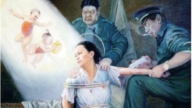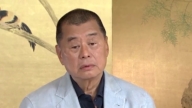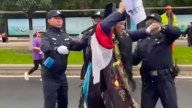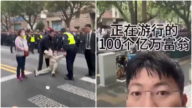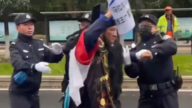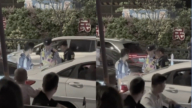【新唐人2012年6月14日訊】自薄熙來下臺後,中共政治局委員張德江被緊急調往重慶。隨後,重慶接連不斷的爆發群體抗爭事件。在重慶萬盛事件還沒有結束的時候,重慶雙橋民間抗暴又不斷升級,當局採取暴力鎮壓的手段,導致民間更大的不滿,張德江似乎陷入泥潭,難以應對。
重慶市萬盛區萬人的反合併抗爭,從4月爆發至今,政府還沒有拿出善後方案,最近,重慶又爆發了大足新區雙橋市民的抗爭事件。
《大紀元》新聞網報導,薄熙來當政時,原雙橋區被樹為全國的所謂樣板區,實行農村城市化,招商引資熱炒得十分火爆。因此農村耕地被政府大量圈佔,徵收價每畝約一萬元左右,但當局轉手倒賣給開發商,每畝高達幾十萬元,甚至超過百萬,造成雙橋區糧田大量荒廢,工廠林立。
而雙橋區的黨政要員,上至區委書記、區長,下至村級的村長、隊長,在炒賣土地不法活動中巧立名目,中飽私囊,大發橫財,一夜之間成為腰纏萬貫的暴發戶。利益受到損害的農民們為了拿回政府當時承諾的權益,開始了一波波上訪維權運動。
自薄熙來下臺後,中共政治局委員張德江被緊急調往重慶,在處理雙橋區民眾的維權抗爭時,張德江調動公安、防暴警察、武警、城管、保安等數千人,用暴力驅逐聚集的農民群眾,造成上千農民受傷,導致民間更大不滿。雙橋的工商士農,各個階層自發的聲援無辜農民,並掀起罷工罷市,抗議當局。事態還在不斷的蔓延擴展。
美國「哥倫比亞大學」政治學博士、時政評論家李天笑:「張德江現在在重慶陷入泥潭,整個的重慶到處是抗議,接連不斷,而且聲勢也很大。」
獨立評論員洪劍表示,重慶是個爛攤子,薄熙來掌權時留下的後遺症太多,太複雜,隨時可能引爆。
洪劍:「其實張德江是血債派人物,他在鎮壓法輪功、鎮壓維權人士、掩埋溫州動車殘骸、貪腐腐敗方面劣跡斑斑,這樣的一個人,為甚麼能夠接掌重慶那一塊呢?張德江他這個血債派麼,他的本性不改,他還是用了殘酷鎮壓的手段去來對付民眾的維權事件,這一個事件已經引起了全民的公憤。」
據報導,經過了2個月的萬人群體抗爭騷亂,萬盛區當地民眾與警方出現互不侵犯的僵持狀態。萬盛區目前即使民眾三五成群,白天在街頭聚集,維穩單位不會主動動手,雙方都相對疲纍。有中國民間維權團體呼籲當局,讓萬盛全區市民通過投票來解決問題。
大陸維權團體《中國天網人權事務中心》負責人黃琦呼籲,既然目前萬盛地區情勢僵持,政府是否考慮採取區內全民公投方式,讓民眾選擇行政區屬的最佳解決方案,以此作為今後解決公民社會類似矛盾和衝突的方法。
而萬盛居民向《天網》表示,官方已派人徵求民間意見,但諮詢流於形式,沒有誠意,當局一如既往的採取統戰策略。
採訪編輯/常春 後製/肖顏
Mass Protests in Chongqing Escalate:
Zhang Dejiang ‘Stuck in Mud’
After Bo Xilai was removed, Zhang Dejiang, a member
of the Chinese Communist Party (CCP) Politburo,
was transferred to Chongqing immediately.
This triggered successive mass protests in Chongqing.
The protest in Wansheng District,
Chongqing has not yet been resolved.
Another protest began in Shuangqiao District
and is still escalating.
The authorities have suppressed these protests
by brutal force, which has aroused more anger.
Zhang Dejiang is now ‘stuck in mud’,
and it is hard for him to find a way out.
Since the mass protest against a merging of districts
in Wansheng District in April,
the government has not yet found a way
to resolve the situation.
Recently, thousands of residents in Chongqing’s former
Shuangqiao District began to protest against the merger of their district with Dazu District.
According to The Epoch Times, the former
Shuangqiao District was regarded as a sample
of rural urbanization under Bo Xilai,
and foreign investments were heavily introduced.
The government expropriated farms massively,
with compensation approximately 20,000 Yuan per acre.
The government then went on to sell the land to developers
at a high prices of several hundred thousand Yuan, Prices even exceeded over 1 million.
As a result, much of the land in Shuangqiao District
went unused, and many factories began appearing.
By land confiscation, all levels of Shuangqiao District
officials began to line their pockets, quickly becoming rich.
This spanned from party secretaries, district chiefs
to village heads and team captains.
To get the compensation promised
by the government, villagers appealed.
They began waves of rights protection movements.
After Bo Xilai was removed, Zhang Dejiang,
a member of the CCP’s Politburo,
was transferred to Chongqing immediately to tackle
the mass protests in Shuangqiao District.
Zhang dispatched thousands of public security officers,
riot police, armed police, and urban management officers.
They were to disperse the crowd by force. Over a thousand
farmers were injured and stronger dissatisfaction was aroused.
Many people in Shuangqiao District started their silent
support for the innocent farmers by going on strike. The conflict is still spreading now.
Li Tianxiao, a Doctor of Political Science
at Columbia University commented.
“Zhang Dejiang is ‘stuck in mud’, with constant
large-scale protests all over Chongqing.”
Hong Jian, an independent commentator, said that
Chongqing has a massive debt left by Bo Xilai.
Things are so complicated. It is like a bomb
that could be set off at any time.
Hong Jian: “Zhang Dejiang is a member of the blood-debt
faction, with a notorious record of persecuting Falun Gong.
He also has a record of suppressing human rights activists,
burying the Wenzhou train incident, and corruption.
How can such a person take over charge of Chongqing?
As a blood-debt faction member with such evil nature,
Zhang keeps using brutal force to tackle mass incidents and has aroused wide anger.”
It is reported that 2 months after the mass protest
in Chongqing’s Wansheng District, residents and police are now at a deadlock.
Currently, even if a small number of three to five residents
gather in streets during the day, the police take no action.
Both sides are held by each other.
Some rights protection organizations in China appealed
to the authorities to solve the problem by a referendum in Wansheng.
Huang Qi, Chair of China Tianwang Human Rights Service,
a rights protection organization in China, appealed
to the government for a referendum within the district
to solve the current deadlock in Wansheng.
This was to let residents decide the administrative division
of their district and use referendum to solve further social conflicts in the future.
Wansheng residents told Tianwang that the authorities
had asked for public opinions, but it was merely a formality.
They had no sincerity and tended to use
the united front strategy as usual.


